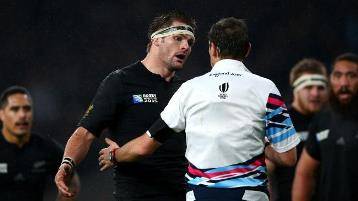 Webster defines simulation as “the act or process of pretending; feigning.”
Webster defines simulation as “the act or process of pretending; feigning.”
For those not familiar with how the term applies to soccer, it can best be characterized as attempting to fool the referee into calling a foul in your team’s favor. Commonly called flopping or diving, it can occur anywhere on the field, but is usually attempted inside the 18 yard box outside the opponent’s goal because a foul called inside this area is awarded a penalty-kick (essentially a free goal).
There has been a lot of controversy over the last couple weeks in English football as Manchester United star Ashley Young earned a penalty kick two successive weekends and was clearly shown on instant replay to be diving both times. This has generated a lot of discussion on message boards and blogs across the Internet and lead to him being left out of the line-up last weekend. It got me to thinking – always dangerous – about whether this should be considered cheating. If so, should it be punishable by the governing body after the fact, i.e. even if the referee doesn’t spot it during the match, similar to the way the NFL hands out fines or suspensions for vicious hits.
Referees already have the ability to penalize divers by issuing them a yellow card, but unless the player in question is known as a “flopper”, and the referee is keeping a close eye on them, this infringement is rarely called. I have seen countless penalty-kicks awarded, but only a handful of yellows given for simulation – the technical term for the act. So, the risk-reward proposition would seem to favor attempting the dive.
Simulation is certainly not unique to the sport of soccer. How often have you seen a receiver in American football jump up after clearly being tackled/touched down and attempt to gain more yardage? Haven’t you seen an outfielder lift his glove after a “catch” that was short-hopped, showing the ball and implying he caught it cleanly? A hockey player grab his face after being cross-checked in the chest? A basketball player lifting both hands claiming no foul, as the other player scrapes himself off the floor? “Play Acting” can be found in all sports by athletes trying to gain an advantage over their opponent.
But is all “play acting” created equally? My son plays club soccer and his coach teaches the boys that every throw-in is theirs. Meaning, if the ball goes out of play, grab it quickly and throw it in. Let the referee call the play back if he did not actually grant them possession. If done confidently, a referee may second guess himself and allow the play to stand. This is also simulation, certainly to a lesser degree, but it could still lead directly to scoring – possibly unfairly. His coach refers to this as “Gamesmanship” and regularly provides the team with guidance on how he’d like it executed.
So then, is gamesmanship cheating? Is flopping just gamesmanship? Does too much gamesmanship ruin the game? Is there a grey area between clearly wrong, and by the book, that it’s OK to operate in?
In my opinion there is certainly room for some gamesmanship, i.e. the rushed throw in, the fielded short-hop, the run after being tackled, but feigning violence and inviting severe punishment against an opponent is where I draw the line. Using simulation to earn penalty-kicks (points), or with the intent to get someone ejected (faking violent injury) – especially in the youth game – is too much and has no place in any sport. It is teaching our children that winning is more important than having integrity and respecting the spirit of the game being played. Let’s all take a deep, relaxing breath and enjoy watching our athletes compete for the sake of the competition. Remind them to play hard, play fair, and enjoy their sports experience.